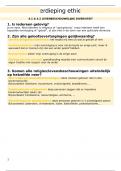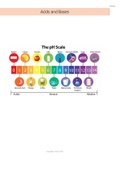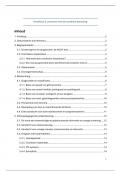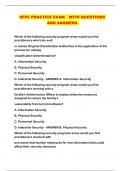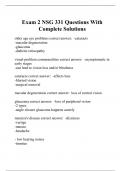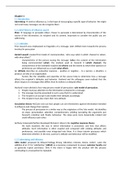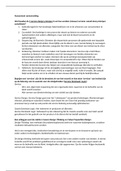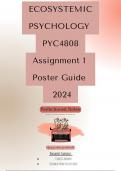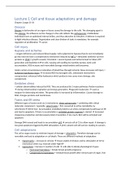Week 1 Introduction to Mindfulness
Effectiveness of MBCT compared with maintenance antidepressant treatment in the prevention
of depressive relapse
Kuyken et al. (2015)
BACKGROUND- currently, maintenance antidepressants for at least 2 years is the recommended treatment, but
many individuals are interested in alternatives to medication.
AIM- finding out if MBCT, while lowering antidepressants (MBCT-TS), is superior to maintenance
antidepressants (m-ADM) for the prevention of depressive relapse or recurrence over 24 months.
METHOD- 425 participants with recurring major depression disorder were randomly selected to be in one of 2
conditions: m-ADM or MBCT-TS.
RESULTS- the time to relapse or recurrence was not different between the 2 groups (MBCT-TS 44% relapse, m-
ADM 47% relapse).
CONCLUSION- MBCT (together with a lowering of antidepressant) is a good maintenance treatment after use
of antidepressant medication in the acute state of depression. It is, however, not superior to antidepressants.
Standardized Mindfulness-Based Interventions in Healthcare: An Overview of Systematic
Reviews and Meta-Analyses of RCTs
Gotink et al. (2015)
BACKGROUND- mindfulness-based therapies are being used in a wide range of common chronic conditions,
as treatment and prevention, despite lack of consensus about their effectiveness in different patient categories.
AIM- systematically review the evidence of the effectiveness of MBSR and MBCT in different patient
categories.
METHOD- a systematic review and meta-analysis of systematic reviews of RCTs, using the standardized
MBSR or MBCT programs.
RESULTS- MBSR and MBCT, compared to wait list control and compared to treatment as usual, significantly
improved depressive symptoms, anxiety, stress, quality of life and physical functioning.
CONCLUSION- there is support for the use of MBSR and MBCT to alleviate both mental and physical
symptoms in the adjunct treatment of cancer, cardiovascular disease, chronic pain, depression, anxiety disorders
and in prevention in healthy adults and children.
Slides lecture 1
Key characteristics of mindfulness
Observing, describing, awareness, non-judging, non-reactiveness.
Mindfulness as a trait-state-practice à Mindfulness can be a personality trait, a state of mind or a practice.
Mindfulness training
MFT Consists of different parts:
• Psychoeducation: education the group about mindfulness; getting to know them/why they are there.
• Experiential learning: practicing with mindfulness by yourself.
• Inquiry: evaluation of the practice; experiences of the group; what did you feel/notice?
• Group training: practicing mindfulness exercises in groups.
, Mindfulness across the life span
Mindfulness training (MFT) Cognitive based therapy (CBT)
• Observation of thoughts • Evaluation of thoughts
• Letting thoughts pass; no evaluation • Clear goal: changing behavior or thoughts
• No specific goal; non-striving; non-judging • CBT therapists aren’t expected to engage in
• Teachers are expected to engage in own practice regular practice
Mindfulness based stress reduction (MBSR) Mindfulness based cognitive therapy (MBCT)
• Initial focus on physical aspects • Initial focus on randomized controlled trials
• Populations with wide range of problems; • Came after MBSR; integration with CBT
mainly physical • Specifically for depression
• More generic application for stress • Greater emphasis on psychological aspects of
experience (CBT elements)
Week 2 Mindful with your Baby/Toddler
Mindful With Your Toddler Group Training: Feasibility, Acceptability, and Effects on
Subjective and Objective Measures
Potharst et al. (2017)
BACKGROUND- toddler years are essential in the development of self-regulation in children. They gradually
progress from being primarily externally regulated, to mostly self-regulated. When a mother’s availability or
capability to help her child regulate is insufficient, early intervention and support is important.
AIM- studying the effectiveness of ‘mindful with your toddler’: a 9-week mindful parenting group training for
mother-toddler experiencing (co-)regulation difficulties.
METHOD- 22 dyads of clinically referred mothers and toddlers with (co-)regulation problems participated in
groups of 3-6 pairs. The toddlers are present in half of the sessions. Mothers completed questionnaires (on
parenting, psychopathology, partner relationship, mindful parenting, self-compassion, and child outcomes) and
free-play observations were conducted (and coded for maternal sensitivity and acceptance).
ASSESSMENT- questionnaires were completed at waitlist, pretest, posttest, 2-month, and 8-month follow-up.
RESULTS- between pre- and posttest the following improved:
• observed maternal sensitivity and acceptance;
• child psychopathology;
• maternal listening with full attention and;
• maternal mindfulness and self-compassion.
These effects were stable or further improved during follow-up. Improvement in child dysregulation, maternal
internalizing psychopathology and stress were only seen at follow-ups.
CONCLUSION- mindful with your toddler is a promising intervention for mothers with toddlers with (co-)
regulation problems.
Slides lecture 2
Post-partum psychological problems
Pregnancy and birth can have psychological problems as a consequence:
• 50% of women experience ‘maternity blues’;
o 19% experience a post-partum depression (PPD);
• 10% experience anxiety disorder, and;
• 9% experience PTSD.
These problems are the result of stress factors associated with pregnancy and birth:
• Baby: illness, crying, sleep problems, feeding problems, preterm birth.
• Pregnancy/birth: miscarriages, medical problems.
• Family circumstances: conflicts in the family, relationship problems, financial worries.



